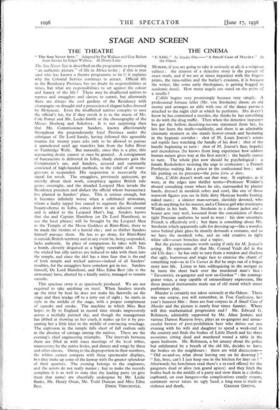THE CINEMA
"L'Alibi." At Studio Onc—"A Small Case of Murder." At the Odeon MURDER, if you are going to take it seriously at all, is a religious subject : the interest of a detective story is the pursuit of exact truth, and if we are at times impatient with the finger- prints, the time-tables and the butler's evasions, it is because the writer, like some early theologians, is getting bogged in academic detail. How many angels can stand on the point of a needle ?
L'Alibi begins very promisingly because very simply. A professional fortune teller (Mr. von Stroheim) shoots an old
enemy and arranges an alibi with one of the dance partners
attached to the night club at which he performs. She dc esn't know he has committed a murder, she thinks he has son- ething
to do with the drug traffic. Then when the detective inspector has got the hollow, deceiving-no-one statement from her, he lets her learn the truth—suddenly, and there is an admirable cinematic moment as she stands horror-struck and hesitating in the hygienic corridor : shot of M. Louis Jouvet's astute sad reptile face watching the handle of his door : shot of the handle beginning to turn : shot of M. Jouvet's face, hopeful and incredulous (he knows from long experience how seldom human nature gives way at the first attack) : the handle ceases
to turn. The whole plot now should be psychological : a female Raskolnikov resisting the urge to confession : a French Porthyrius waiting like a priest in the confessional box : and life putting on its pressure—the peine forte et dure.
Alas, L'Alibi doesn't work out that way. It explodes, as it were, at the edges into thriller terms—Professor Winkler's
absurd consulting room where he sits, surrounded by plaster hands, dressed in monkish robes and cowl, like one of those waxwork figures you see in little dirty Mexican booths beating naked nuns ; a sinister man-servant, slavishly devoted, who will do anything for his master, and a Chinese girl who manicures Winkler in his bath. Mr. Stroheim in a dinner jacket. and a boater acts very well, loosened from the constriction of those tight Prussian uniforms he used to wear : his slow 'uncertain French is effectively evil ; but there is something about Mr.
Stroheim which apparently calls for dressing-up—like a wooden torso behind plate glass he mutely demands a costume, and so we have the monkish robe, and an odd creation in tight white silk—court breeches and a rapier.
But the picture remains worth seeing if only for M. Jouvet's acting. He represents all that Mr. Conrad Veldt did in the old Ufa days : he has only to turn from a window and disclose
that ugly, humorous and tragic face to exercise- the charm of something real—as in Un Carnet de Bal he steps out of a bogus
story into life. Listen to him soliloquising in the morgue as he turns the sheet back over the murdered man's face : " Ex-convict, ex-gangster and now ex-Gordon" : the nutmeg- grater voice, a rasp capable of extraordinary expression, like those musical instruments made out of old metal which street performers play.
Murder is certainly not taken seriously at the Odeon. There was one corpse, you will remember, in True Confession, last year's funniest film : there are four corpses in A Small Case of Murder and the picture is nearly four times funnier. Where will this mathematical progression end ? Mr. Edward G.
Robinson, admirably supported by Mr. Allen Jenkins and various Damon Runyon boys, plays an ex-gangster and unsuc- cessful brewer of post-prohibition beer who drives out one evening with his wife and daughter to spend a week-end in the country and finds the bodies of Little Dutch and his three associates sitting dead and murdered round a table in the spare bedroom. Mr. Robinson, a bit uneasy about the police but exhilarated by a breath of the old life, decides to leave
the bodies on the neighbours : there are wild discussions- " Old so-and-so, what about leaving one on his doorstep ? "
" Say, boss, can't I just keep one in the kitchen for later on ? ". Afterwards his henchmen read there's a re Nerd offered for the gangsters dead or alive (ten grand apiece) and they fetch the bodies back in the middle of a party and stow them in a clothes cupboard, on coat hangers—the complications crazily mount, sentiment never raises its ugly 'mad, a long nose is made at


















































 Previous page
Previous page